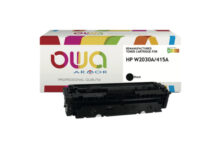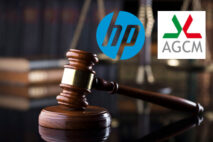Rejecting arguments presented by the West Virginia-based remanufacturer Impression Products, the U.S. Court of Appeals for the Federal Circuit sided with the hardware manufacturer Lexmark International in its 134-page decision released on February 12 (see “Federal Circuit Finds in Lexmark’s Favor, Upholds Jazz Photo and Mallinckrodt”). The decision came after a special en banc panel of 12 judges from the appellate court heard the matter on October 2, 2015 (see “Federal Circuit Holds En Banc Hearing in Lexmark v. Impression Products”). Ten of the twelve empaneled judges joined in the majority opinion while two dissented.
The litigants had locked horns over two key issues governing the exhaustion of patent holders’ rights under U.S. patent law. Claiming patent infringement, Lexmark filed suit against Impression Products in the U.S. District Court for the Southern District of Ohio, and in its defense the remanufacturer challenged the validity of the so-called Jazz Photo and Mallinckrodt decisions (see “Lexmark and Impression Products Spar over Jazz Photo” and “Lexmark Drags Prebate Infringement Claims into Ohio Lawsuit”). After the Ohio court rendered a split decision for the two litigants in March 2014 (see “Impression Products Wins One, Loses One Motion to Dismiss Lexmark Lawsuit”), the pair brought the matter to the appellate court. After reviewing the Ohio court’s decision, the Federal Circuit decided to hear the appeal en banc (see “Federal Circuit Wants All Judges to Weigh In on Lexmark v. Impression Product Appeal”); such hearings are rare and reserved for complex matters of law.
(Note: For a complete history of the suit and related complaints, see Lexmark v. Impression Products [2014] and Lexmark v. Ink Technologies Printer Supplies et al. [2010].)
Writing for the majority of judges, Circuit Judge Richard Taranto said the panel considered if the “the uncodified doctrine of patent exhaustion” expressed in Jazz Photo and Mallinckrodt remained “sound” in light of more recent Supreme Court rulings. After its review, the Federal Circuit reaffirmed the “principles of our earlier decisions,” wrote Judge Taranto. In so doing, it rejected all of Impression Products’ arguments for invalidating Jazz Photo and Mallinckrodt. The two decisions thus remain part of U.S. patent case law.
By reaffirming the two decisions, the court handed Lexmark—and by extension all OEMs—a decisive victory. Reversing the earlier decisions would have dramatically changed U.S. patent law in a way that would have benefited third-party supplies vendors doing business in the United States. Such a reversal would have lifted many restrictions currently enforced on the collection and use of empty cores, especially those first sold outside of the United States. Many court-watchers had predicted the panel of judges would reverse the appellate court’s earlier rulings, thus increasing the availability of empties and lowering the price of cores in the United States.
I expect that while many third-party supplies vendors are bitterly disappointed at the court’s ruing, for most firms the decision just means business as usual. By upholding the earlier decisions, the Federal Circuit effectively maintained the status quo within the hard copy industry.
Some Background
According to Judge Taranto, in its original case, Impression Products had not questioned the validity of Lexmark’s patents as they were written or challenged the OEM on antitrust grounds such as by claiming that Lexmark had misused its patents to gain an unfair competitive advantage. Instead, Impression Products argued that recent rulings from the U.S. Supreme Court “had made Mallinckrodt and Jazz Photo no longer good law.” The remanufacturer reasoned that because Mallinckrodt and Jazz Photo had been rendered moot by the higher court’s findings, it had not infringed Lexmark’s patents. Impression Products believed the patents were exhausted after the first sale of the product.
A central matter under review by the panel of judges was the status of Jazz Photo, which maintains that the first sale of a product must occur within the United States if a patentee’s rights are to be exhausted. Conversely, if products are sold for the first time in a foreign market, the patentee retains its patent rights. Part of Lexmark’s suit alleged Impression Products violated its patents by importing, remanufacturing, and marketing cartridges first sold outside of the United States. Although the Jazz Photo decision was decided nearly 15 years ago and later upheld by the Federal Circuit, Impression Products maintained that the Jazz Photo decision was no longer valid because of the U.S. Supreme Court’s ruling on copyright exhaustion in Kirtsaeng v. John Wiley & Sons, Inc. The Kirtsaeng case involved used books first sold outside of the United States that were later imported into that country and resold. The publisher, John Wiley & Sons, sued claiming its copyrights had been violated because the sales occurred outside of the United States. However, the Supreme Court found that copyrights were exhausted upon any authorized sale regardless of where the sale was made. Impression Products argued that the same principle should be applied to patent law.
The second matter the remanufacturer challenged was what is known as the Mallinckrodt decision, which was handed down in 1992 and like Jazz Photo later upheld by the Federal Circuit. Mallinckrodt governs certain post-sale restrictions that a patent holder can place on a patented product. Lexmark used Mallinckrodt to assert it retained the rights to certain patents on its Return Program SKUs, although normally those rights would have been exhausted after the first sale of the cartridge. As part of the OEM’s initial infringement suit, Impression Products had been accused of remanufacturing cartridges first sold through Lexmark’s Return Program, but the defendant argued Mallinckrodt was no longer observed and so it did not infringe.
As noted above, ultimately the Federal Circuit rejected all Impression Products’ claims. Adhering to Mallinckrodt, Judge Taranto said the court found “that a patentee, when selling a patented article subject to a single-use/no-resale restriction that is lawful and clearly communicated to the purchaser, does not by that sale give the buyer, or downstream buyers, the resale/reuse authority that has been expressly denied. Such resale or reuse … remains unauthorized and therefore remains infringing conduct.” In upholding Jazz Photo, the judge said, “A U.S. patentee, merely by selling or authorizing the sale of a U.S.-patented article abroad, does not authorize the buyer to import the article and sell and use it in the United States, which are infringing acts in the absence of patentee-conferred authority.”
Reviewing the Split Decision
In issuing its ruling, the appellate court overruled one of the lower court’s decisions. The U.S. District Court for the Southern District of Ohio had agreed with Impression Products’ argument as it pertained to Mallinckrodt. Citing the U.S. Supreme Court’s 2008 Quanta Computer v. LG Electronics decision, as well as a ruling by Judge Gregory F. Van Tatenhove of the U.S. District Court for the Eastern District of Kentucky in Lexmark v. Static Control Components, the district court held that Lexmark did not retain its patent rights on Return Program cartridges so Impression Products had not violated any patents when remanufacturing and marketing Return Program cartridges. The Federal Circuit disagreed, however. Judge Taranto wrote, “Quanta did not involve the issue presented here,” and later went on to explain that “The Supreme Court has recognized that a patentee may preserve its rights against infringement by establishing restrictions accompanying the sale of the patented article (communicated at the time of sale), including restrictions on the buyer’s post-acquisition use.”
Perhaps more important to the U.S. remanufacturing industry than the appellate court’s decision to uphold Mallinckrodt was the fact the empaneled judges agreed with the lower court’s ruling on Jazz Photo. As discussed above, Impression Products argued that the first sale of Lexmark cartridges overseas exhausted the OEM’s patent rights, supporting its claim with the Supreme Court’s decision in the Kirtsaeng case, a decision that Impression Products argued should be enlarged to include patent law.
The U.S. Court of Appeals for the Federal Circuit, however, disagreed with Impression Products’ line of reasoning. Judge Taranto wrote, “In Kirtsaeng, the Supreme Court did not advert to the foreign-exhaustion issue under patent law.” In fact, he observed that the Supreme Court “nowhere relied on the wealth of exhaustion cases in the patent area.” The lack of any reference to patent law, said the judge, “reinforces the need for a distinct patent-law analysis,” which the Federal Circuit provided. According to Judge Taranto, “The [U.S. Supreme] Court has long recognized the distinctness of the copyright and patent regimes and observed that particular questions require separate analysis for each body of law.” He went on to point out that one important difference in the law is that patent statutes can provide rights that allow the patentee “to exclude others from ‘use,’ whereas the copyright statute does not.” Of course, excluding certain parties from use from is a key issue behind Mallinckrodt.
After reviewing other issues separating patents and copyrights including issues in statute and common law and the higher demands and fees associated with obtaining patents compared to copyrights, Judge Taranto drilled into the issue of a U.S. patent holder’s rights being exhausted by foreign sales. A key reason for allowing U.S. patentees to retain their patent protections is to prevent third parties from purchasing products on foreign markets and importing them for sale in the United States. If a patent holder’s rights were exhausted upon the first sale in a foreign market, such importers could circumvent the monopoly that a U.S. patent confers to the patentee, and the patent holder would then be forced to compete with the imported products. Judge Taranto asserted that the judges reviewing the matter reasoned that if Jazz Photo were overturned, “significant disruption” to current U.S. business practices could arise. “Such disruption is most likely if exhaustion of U.S. rights were held to follow from a foreign sale without the U.S. patentee having the ability to reserve its U.S. rights,” he explained.
Not All Agree
Given the broad implications of the case, it was followed closely by many beyond the printer and consumables industries. Various parties had filed briefs with the appellate court either supporting or rejecting Mallinckrodt and Jazz Photo. A partial list of companies filing briefs included Acer, Costco Wholesale, Dell, Dolby Labs, Google, HTC, Intel, L Brands, LG Electronics, Newegg, Ninestar Image, Qualcomm International, Quanta Computer, QVC, Recycling Times, Samsung, Electronics, Sandisk, Texas Instruments, and others. In addition, a number of trade associations filed briefs such as the American Intellectual Property Law Association, Auto Care Association, Automotive Parts Remanufacturers Association, Biotechnology Industry Organization, Digital Right to Repair Coalition, Electronic Frontier Foundation, Imaging Supplies Coalition, Intellectual Property Owners Association, International Imaging Technology Council, New York Intellectual Property Law Association, Open Source Hardware Association, Pharmaceutical Research and Manufacturers of America, Public Citizen, and Public Knowledge. Obviously, conflicting opinions about the case abounded.
The U.S. Department of Justice, on behalf of the U.S. government, was among the parties filing an amicus brief. While the government’s position was not entirely in line with Impression Products’ argument, there was plenty of common ground. In terms of Mallinckrodt, the government was quite clear: “In the view of the United States, the first authorized sale of a patented article in the United States wholly exhausts the patentee’s exclusive rights in that article, notwithstanding any post-sale restriction imposed by the patentee.” Regarding Jazz Photo, the government’s opinion was more nuanced. Basically, the government argued that the Supreme Court’s Kirtsaeng decision does not mean that U.S. patent rights should be automatically exhausted upon overseas sales. However, the government said Jazz Photo should be partly overturned to the extent that foreign sales can never exhaust U.S. patent rights. The government said the Federal Circuit should “restore the regime of modified international patent exhaustion that prevailed before Jazz Photo,” and allow U.S. patentees to expressly reserve U.S. patent rights in overseas sales.
Although many sought to enlighten the court with their insights, Judge Taranto indicated that the briefs filed by the multitudes played little to no role in the court’s final decision. When concluding his remarks regarding Mallinckrodt, Judge Taranto seemed to dismiss the amici curiae writing, “We have received numerous amicus briefs making competing arguments, with varying degrees of reliable factual support, for the effect of Mallinckrodt on their interests or the interests they promote. We cannot assess those contentions and make policy choices in the way Congress can.” Similarly, regarding the briefs filed arguing for or against overturning Jazz Photo, the judge said, “The amicus briefs filed here present competing arguments about the effect of one foreign-sale exhaustion rule or another on their interests and the interests they promote, offering varying amounts of empirical support. Such arguments necessarily play a much more limited role for us than they might for Congress.”
But Impression Products and those filing amicus briefs in support of overturning the prior case law are not the only parties with a different point of view from the Federal Circuit’s majority opinion. Two of the panel’s judges, Timothy Dyk and Todd Hughes, dissented from the majority opinion. Writing in dissent, Judge Dyk seemed to side with Impression Products. Agreeing with the position taken by the U.S. government, Judge Dyk wrote that “Mallinckrodt was wrong when decided” and that Mallinckrodt now cannot be reconciled with the Supreme Court’s more recent Quanta decision. He went on to conclude, “There is, in sum, no colorable basis for the majority’s failure to follow the exhaustion rule for domestic sales as articulated by the Court in Quanta and numerous other cases.”
Judge Dyk, like the U.S. government, does not feel that Jazz Photo should be overturned altogether. Rather he advocates for U.S. patent holders’ rights to be exhausted if the patentee does not articulate that it is retaining its rights. Judge Dyk writes, “I would retain Jazz Photo insofar as it holds that a foreign sale does not in all circumstances lead to exhaustion of United States patent rights. But, in my view, a foreign sale does result in exhaustion if an authorized seller has not explicitly reserved the United States patent rights.” In ending his dissenting remarks, Judge Dyk said, “In conclusion, I would overrule our decision in Mallinckrodt as inconsistent with governing Supreme Court authority and overrule Jazz Photo to the extent that it imposes a blanket ban on foreign exhaustion. I would recognize foreign exhaustion where the U.S. rights holder has not notified the buyer of its retention of the U.S. patent rights. I respectfully dissent from the majority’s contrary holdings.”
What’s Next?
It appears that Impression Products will appeal its case to the Supreme Court. The remanufacturer’s attorney, Ed O’Connor, said shortly after the verdict came down that he was encouraged by the positions taken by the U.S. government and dissenters from the en banc panel. Mr. O’Connor said he hopes to take the case to the Supreme Court. He feels that the recommendations found in the U.S. government’s amicus brief along with Judge Dyk’s dissenting remarks should persuade the high court to hear the matter. Mr. O’Connor has indicated in the past that the feud between Impression Products and Lexmark was destined to wind up before the Supreme Court because, whatever the Federal Circuit decided, whoever lost would appeal. He is also confident that the Supreme Court will want to take up the matter because he insists that Mallinckrodt and Jazz Photo are bad law and the Supreme Court will want to rectify the problem.
Of course, Mr. O’Connor’s take is only one man’s opinion—and not an unbiased opinion at that. Speaking with other attorneys and patent wonks, I have heard various predictions. In one instance, I was told that the Supreme Court is unlikely to undo the work of the en banc panel so the high court is unlikely to hear the case. Another attorney told me that the only way the Supreme Court will weigh in now is if there are conflicting rulings involving Mallinckrodt and Jazz Photo in other courts. I know of no such conflict, but I don’t follow legal matters outside of our industry so it is possible that there are conflicting opinions in the courts.
I do, however, closely follow the consumables business in the United States, and, like I said at the start of this lengthy post, I don’t think that the appellate court’s verdict will change much. The remanufacturing industry in the United States has been managing to do business despite the Jazz Photo ruling for more than a decade. Today, most remanufacturers selling product in the United States that want to stay on the right side of patent laws go to great lengths to get their empties exclusively from sources within the United States. The thinking is, if the empties broker is based in the U.S. and the broker only collects from end users in the U.S., it is highly unlikely that the original cartridge wasn’t first sold within the United States. Of course, with Jazz Photo firmly in place, OEMs may challenge these assumptions, but the truth is they haven’t yet so why start now?
Predicting what may happen as a result of the court’s decision to uphold Mallinckrodt is a little trickier—although I think the impact will be limited. It may mean that Lexmark will reopen a lawsuit that was overturned in 2009 against Static Control Components. At that time, the U.S. District Court for the Eastern District of Kentucky reversed an earlier decision it had made in favor of the OEM after ruling that Mallinckrodt had been superseded by later decisions from the Supreme Court. In addition to reviving this suit, the OEM may even try to file suits against other companies that remanufacture Return Program cartridges. That seems unlikely, however. My understanding is that Lexmark reached settlements with scores of firms in the United States after the OEM claimed they infringed its patents. In other words, I don’t think there are many companies left in the U.S. remanufacturing industry for Lexmark to sue.
In closing, I should add that if Mallinckrodt and Jazz Photo are truly bad laws as so many involved in this case have said, why doesn’t the U.S. Congress step in and enact new legislation that better reflects doing business in the twenty-first century? Given the number of amicus briefs, it could well be that it is time to write new patent laws that allow U.S. firms to compete more effectively in a global market. Of course, it is laughable to think that lawmakers in Washington, DC, will do anything of substance. That crowd has its own agenda, which does not include writing clear laws for businesses to follow.
So, after all this, stand by—it seems unlikely you’ve heard the last of Mallinckrodt and Jazz Photo.






